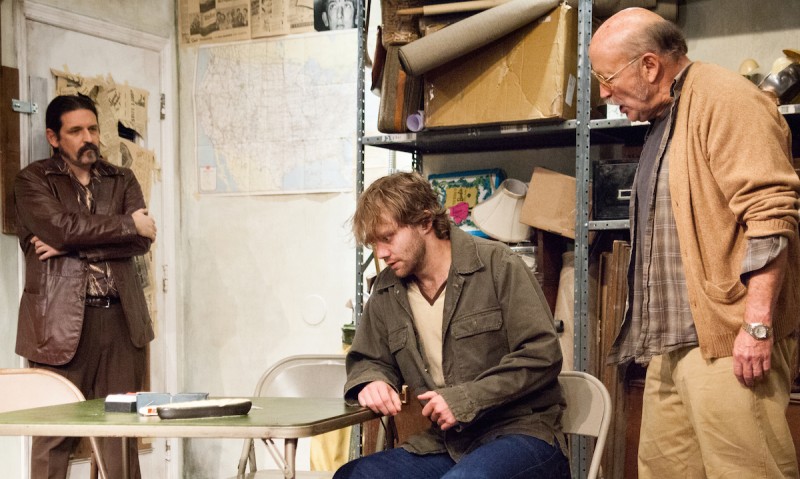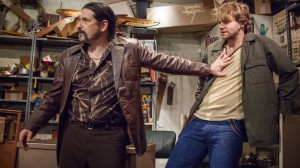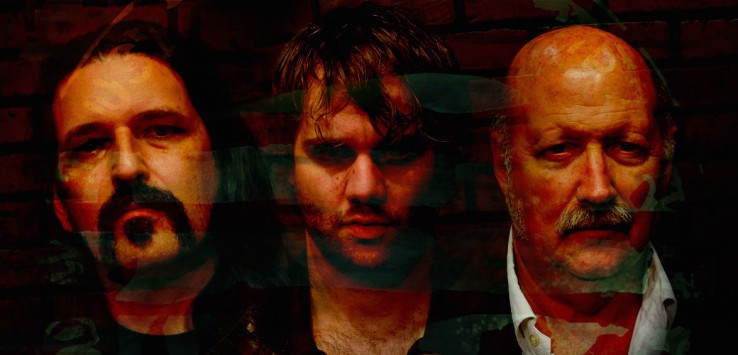By JOAN TADDIE
Guest Critic
Don’s Resale Shop is stuffed aimlessly with discarded junk of little value. Pieces of American culture from the past hang precariously on the walls and are piled on every available metal shelf and empty space on the floor. It is in this claustrophobic setting that we are introduced to the three struggling characters led astray by failing to achieve the American Dream in David Mamet’s play, “American Buffalo,” currently running through November 20th at The Theater on the Edge in Orlando.
Donny Dubrow, the owner of the junk shop, sells a rare buffalo nickel to a wealthy customer and believes the customer tricked him into selling the coin for less than it is worth. Donny comes up with a plan to get even with the customer by robbing him and getting the nickel back along with additional coins from the man’s collection.
The play begins with Donny demanding an apology from Bobby — he left the house instead of doing the required stake out. Bobby is a slow-witted, young man with a drug problem. He has become dependent on Donny who treats him like a surrogate son. Walter “Teach” Cole comes to the shop, hears about the “business” plan and manipulates Donny to eliminate Bobby from the planned robbery because of his inexperience. Teach wants Donny to use him instead. Donny agrees, and disastrous results ensue.
This is a stunning production. The three actors, all Meisner-trained, are so compelling in their characterizations; it’s as if you are watching a master class in acting.

From left: Marco DiGeorge, Zack Roundy and Allan Whitehead in “American Buffalo” at Theater on the Edge.
It is a challenge working with limited lines that often consist of one word: “Nothing,” “Great,” “No.” But Zack Roundy’s superb interpretation and delivery of Bobby’s lines show this talented actor’s physical and mental commitment to communicate Bobby’s thoughts and reactions primarily through non-verbal means. An exceptional example of Mr. Roundy’s focus and commitment to a menacing encounter with Teach. Nothing needs to be said. His body tells the whole story.

Marco DiGeorge and Zack Roundy in “American Buffalo.” Photo by @MonicaMulderPhoto.
“American Buffalo” was awarded the Best Play of 1977 by the New York Drama Critics Circle. Director Pam Harbaugh finds just the right layers of this complex drama to peel back and release her actors into the stratosphere. Although almost all the action in this play takes place off stage, Ms. Harbaugh deftly designs just the right blocking to give the actors opportunities for intense interactions leading to a well played explosive ending trapping characters in a small space.

Joan Taddie, photo by John Sluder
This production should have a longer run. Congratulations to everyone involved in Theater on the Edge.
This review was edited by CATHY MATHIAS, photos by Monica Mulder
SIDE O’ GRITS: “America Buffalo” runs through Nov. 20 at Theater on the Edge, 5542 Hansel Ave., Orlando. Tickets are $24 with discounts for students. Seating very limited. Purchase tickets by clicking here. Call 407-309-0106 or visit TheaterOnTheEdge.org.

